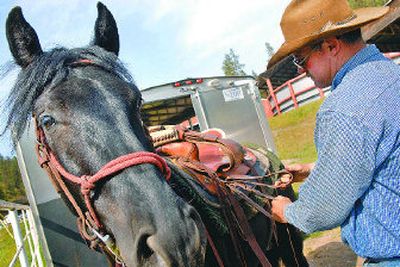Horses to help guard border

Descendants of the same horses that carried soldiers, prospectors, Plains Indians and Spanish conquistadors will be deployed next month by the federal government to help patrol the most rugged reaches of the northern border.
Billed as operation “Noble Mustang,” the U.S. Border Patrol believes this new team of wild horses will not only tighten security but also save taxpayer dollars.
Wild horses are uniquely suited for the backcountry mission, said Danielle Suarez, public information officer for the agency’s Spokane sector. After generations of living in the mountains of the West, the horses have developed unrivaled sure-footedness, musculature and the ability to endure harsh conditions.
“These legends will help us to defend our borders,” Suarez said. “We need horses physically capable of getting into remote and isolated areas.”
Four of the mustangs will be deployed to the station in Whitefish, Mont., which is responsible for watching the backcountry of Glacier National Park. The rest will go to Oroville, where agents regularly patrol the Pasayten Wilderness.
Chief Patrol Agent Robert Harris said if the mustangs perform as expected, more will be adopted and used along the Spokane sector’s 309-mile border, which stretches from the Rocky Mountains in Montana to the east slopes of Washington’s Cascade Range. Top officials in Washington, D.C., are also keeping an eye on the program to see whether it could be expanded to other stretches of the nation’s border, Harris said.
Last year, the Spokane sector established horse patrols at each of its seven stations with horses leased from wranglers, at a cost of roughly $25,000 annually per station, Suarez said. For the wild horses, the Border Patrol is paying a $125 adoption fee, plus $900 for training.
The same mustangs that will be used to hunt drug runners, human traffickers and potential terrorists were trained by convicted criminals. Since 1986, inmates at the Skyline Correctional Center in Canon City, Colo., have broken and trained the captured horses. Working with the horses is a special privilege at the state prison, Suarez said. The training requires extreme patience and trust, he said. “The horses actually help tame the prisoners.”
Along with saving money, rehabilitating inmates and tightening border security, the program provides homes to unwanted horses.
The mustangs are protected by an act of Congress as “living symbols of the historic and pioneer spirit of the West.” But with their population unchecked, the herds have faced starvation after overgrazing rangeland and wildlife habitat, especially during droughts.
The U.S. Bureau of Land Management now conducts regular roundups and offers excess animals for adoption.
Last year, however, homes were found for only half of the 8,789 horses removed from public lands across the West, according to the agency.
The Border Patrol’s new mustangs arrived in early March at the Colville station, where trained agents began working with the horses.
Most are between 3 and 4 years old and were rounded up in Wyoming late last year. Two are from Nevada, and another is from California. “They’re extremely, extremely tamed,” said Suarez, the agency spokeswoman.
Along with the training, the mustangs were given names by students. In early June, Sisko, Hidalgo, Spurs, Okanogan, Kootenai, Ike, Chase and Slash will again find themselves roaming a rugged Western landscape.
Only this time, the mustangs will wear saddles, feed on oats and work for the Department of Homeland Security.